 A lifetime of bleeding and crying. A lifetime of undoing the body to understand the body, to receive the body. This is configured in many ways. A woman disconnected from her womanhood loses her hair, loses her scales, becomes a porpoise. And a porpoise is a man, even if it’s a fish, and even if it’s female. A thing, ladies and gentlemen, is a thing. The other is a porpoise, and a porpoise is a porpoise, a woman is a woman, one is slippery and the other isn’t.
A lifetime of bleeding and crying. A lifetime of undoing the body to understand the body, to receive the body. This is configured in many ways. A woman disconnected from her womanhood loses her hair, loses her scales, becomes a porpoise. And a porpoise is a man, even if it’s a fish, and even if it’s female. A thing, ladies and gentlemen, is a thing. The other is a porpoise, and a porpoise is a porpoise, a woman is a woman, one is slippery and the other isn’t.
04.06.2025 | by Manuella Bezerra de Melo
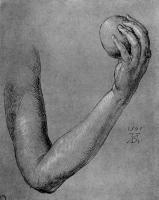 What is a person? It's a threshold question, as if it could only be asked in the passage between an end and a beginning, at a moment when the list of the virtues of human existence is exhausted, dries up, and we finally see that what we thought was properly human is, after all, shared with other beings. In its tendency to move away from purist differentiations governed by exclusive properties, science not only fails to offer this guarantee, but has contributed to shattering the logic of unity, of restriction, of what is, in short, singular.
What is a person? It's a threshold question, as if it could only be asked in the passage between an end and a beginning, at a moment when the list of the virtues of human existence is exhausted, dries up, and we finally see that what we thought was properly human is, after all, shared with other beings. In its tendency to move away from purist differentiations governed by exclusive properties, science not only fails to offer this guarantee, but has contributed to shattering the logic of unity, of restriction, of what is, in short, singular.
19.04.2025 | by Marta Rema
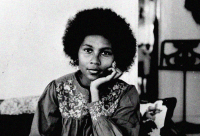 The author argues that racism and sexism, institutionalized as patriarchy, are at the base of the social structure, in this case in the United States, but can be extrapolated to many other societies, such as our own. By criticizing the various feminisms that have left out the experiences and social places of black women, she shows how they have had to carve out their own path of resistance. T
The author argues that racism and sexism, institutionalized as patriarchy, are at the base of the social structure, in this case in the United States, but can be extrapolated to many other societies, such as our own. By criticizing the various feminisms that have left out the experiences and social places of black women, she shows how they have had to carve out their own path of resistance. T
01.04.2025 | by Marta Lança
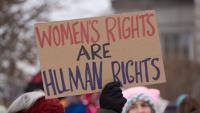 The long history of advocacy around “women’s rights are human rights” features activists from the Global South and women of color in the US. For instance, in 1945, at the founding of the United Nations, Latin American feminists played a critical role in trying to advance “women’s rights” into the category of human rights. And after World War II, when the US Black freedom movement often deployed human rights arguments, Pauli Murray, the attorney, feminist, and civil rights advocate, argued specifically that “women’s rights are a part of human rights.” What changed at the end of the 20th century was that a far-reaching and expanding global feminist movement began to collectively use the idea that “women’s rights are human rights” to advocate for change at the United Nations and beyond.
The long history of advocacy around “women’s rights are human rights” features activists from the Global South and women of color in the US. For instance, in 1945, at the founding of the United Nations, Latin American feminists played a critical role in trying to advance “women’s rights” into the category of human rights. And after World War II, when the US Black freedom movement often deployed human rights arguments, Pauli Murray, the attorney, feminist, and civil rights advocate, argued specifically that “women’s rights are a part of human rights.” What changed at the end of the 20th century was that a far-reaching and expanding global feminist movement began to collectively use the idea that “women’s rights are human rights” to advocate for change at the United Nations and beyond.
08.10.2021 | by Lisa Levenstein
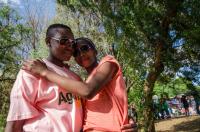 Am I a sin to God? Religious interpretation—violence in the name of God—is killing lesbian, gay, trans, bisexual and intersex persons. They might not have killed me on that bus, but have you ever seen a bus full of people, filled with the ecstasy of God? Ready to defend his words to the sinners, to stone, to judge? Those are who we live with, eat with, ride a bus with. How are we safe?
Am I a sin to God? Religious interpretation—violence in the name of God—is killing lesbian, gay, trans, bisexual and intersex persons. They might not have killed me on that bus, but have you ever seen a bus full of people, filled with the ecstasy of God? Ready to defend his words to the sinners, to stone, to judge? Those are who we live with, eat with, ride a bus with. How are we safe?
16.04.2021 | by Brindley J. Fortuin
 We have a lot in common, much more than “having shared the same kind of love”. In what concerns the rights of women, we have an oppression and social injustice past and present in common. We are both oppressed in the sense that we don’t have the power of decision over our own bodies; we cannot decide whether to get out of an exploitative relationship or not because society, family, church, culture, traditions will tell you that you need to put up with it and stop “rebelling”.
We have a lot in common, much more than “having shared the same kind of love”. In what concerns the rights of women, we have an oppression and social injustice past and present in common. We are both oppressed in the sense that we don’t have the power of decision over our own bodies; we cannot decide whether to get out of an exploitative relationship or not because society, family, church, culture, traditions will tell you that you need to put up with it and stop “rebelling”.
04.12.2018 | by Leopoldina Fekayamãle
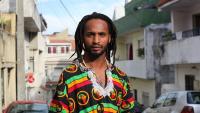 The new case, currently being heard in court, rejects the version of events previously offered by the police officers, and charges them with physical assault, aggravated kidnapping, inhumane treatment and inciting racially-motivated discrimination, hatred and violence - as well as slander, falsifying witness testimonies and falsifying documentation.
The new case, currently being heard in court, rejects the version of events previously offered by the police officers, and charges them with physical assault, aggravated kidnapping, inhumane treatment and inciting racially-motivated discrimination, hatred and violence - as well as slander, falsifying witness testimonies and falsifying documentation.
05.11.2018 | by Ana Naomi de Sousa
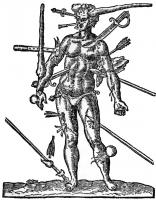 Human hair was already being sold long before capitalism; the sale of human milk was common in ancient Rome and this was even a source of income for many women during the Industrial Revolution. But the first example was not an exchange of commodities in the modern sense, nor in the latter was there any recognition of women as true self-owners. The sale of blood, permitted during most of the twentieth century, was perhaps one of the first generalized ways in which self-ownership left the abstract “straitjacket” of labour power and extended to a physical element of the body, albeit renewable, thus allowing for an additional or last resort income for the most vulnerable self-owners.
Human hair was already being sold long before capitalism; the sale of human milk was common in ancient Rome and this was even a source of income for many women during the Industrial Revolution. But the first example was not an exchange of commodities in the modern sense, nor in the latter was there any recognition of women as true self-owners. The sale of blood, permitted during most of the twentieth century, was perhaps one of the first generalized ways in which self-ownership left the abstract “straitjacket” of labour power and extended to a physical element of the body, albeit renewable, thus allowing for an additional or last resort income for the most vulnerable self-owners.
24.02.2015 | by Bruno Lamas
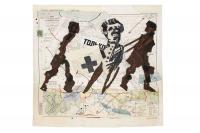 In this 2nd call we announce both topics together – BODY: IMAGES AND GEOGRAPHIES – by the inherent articulation between body, representations and space, which are not separate forms nor constitute an organically organized ecosystem. They build up each other correlatively. Thus, space is not present as mere neutral recipient of physical action and experience, it is first likely to influence and transform the body, simultaneously generating new representations. We witness a (more or less active) constant negotiation between body, representations and space.
In this 2nd call we announce both topics together – BODY: IMAGES AND GEOGRAPHIES – by the inherent articulation between body, representations and space, which are not separate forms nor constitute an organically organized ecosystem. They build up each other correlatively. Thus, space is not present as mere neutral recipient of physical action and experience, it is first likely to influence and transform the body, simultaneously generating new representations. We witness a (more or less active) constant negotiation between body, representations and space.
19.06.2013 | by Buala
 These lives can be affected without being subject to a "duel", because precariousness is necessary for the protection of other individuals’ lifestyle or life. So we cannot think about the body without considering the conditions that make it vulnerable to precariousness, which are issues relating to gender, origin, sexual orientation, sexuality, class, race, cultural difference, disease, disability, complexion, or age. In this sense, we aim to insist less on identity politics or claims (and their misleading subversion), and more on precariousness and its distribution of difference and exploitation in the maps of contemporary power.
These lives can be affected without being subject to a "duel", because precariousness is necessary for the protection of other individuals’ lifestyle or life. So we cannot think about the body without considering the conditions that make it vulnerable to precariousness, which are issues relating to gender, origin, sexual orientation, sexuality, class, race, cultural difference, disease, disability, complexion, or age. In this sense, we aim to insist less on identity politics or claims (and their misleading subversion), and more on precariousness and its distribution of difference and exploitation in the maps of contemporary power.
06.02.2013 | by Buala
 A lifetime of bleeding and crying. A lifetime of undoing the body to understand the body, to receive the body. This is configured in many ways. A woman disconnected from her womanhood loses her hair, loses her scales, becomes a porpoise. And a porpoise is a man, even if it’s a fish, and even if it’s female. A thing, ladies and gentlemen, is a thing. The other is a porpoise, and a porpoise is a porpoise, a woman is a woman, one is slippery and the other isn’t.
A lifetime of bleeding and crying. A lifetime of undoing the body to understand the body, to receive the body. This is configured in many ways. A woman disconnected from her womanhood loses her hair, loses her scales, becomes a porpoise. And a porpoise is a man, even if it’s a fish, and even if it’s female. A thing, ladies and gentlemen, is a thing. The other is a porpoise, and a porpoise is a porpoise, a woman is a woman, one is slippery and the other isn’t.  What is a person? It's a threshold question, as if it could only be asked in the passage between an end and a beginning, at a moment when the list of the virtues of human existence is exhausted, dries up, and we finally see that what we thought was properly human is, after all, shared with other beings. In its tendency to move away from purist differentiations governed by exclusive properties, science not only fails to offer this guarantee, but has contributed to shattering the logic of unity, of restriction, of what is, in short, singular.
What is a person? It's a threshold question, as if it could only be asked in the passage between an end and a beginning, at a moment when the list of the virtues of human existence is exhausted, dries up, and we finally see that what we thought was properly human is, after all, shared with other beings. In its tendency to move away from purist differentiations governed by exclusive properties, science not only fails to offer this guarantee, but has contributed to shattering the logic of unity, of restriction, of what is, in short, singular.  The author argues that racism and sexism, institutionalized as patriarchy, are at the base of the social structure, in this case in the United States, but can be extrapolated to many other societies, such as our own. By criticizing the various feminisms that have left out the experiences and social places of black women, she shows how they have had to carve out their own path of resistance. T
The author argues that racism and sexism, institutionalized as patriarchy, are at the base of the social structure, in this case in the United States, but can be extrapolated to many other societies, such as our own. By criticizing the various feminisms that have left out the experiences and social places of black women, she shows how they have had to carve out their own path of resistance. T  The long history of advocacy around “women’s rights are human rights” features activists from the Global South and women of color in the US. For instance, in 1945, at the founding of the United Nations, Latin American feminists played a critical role in trying to advance “women’s rights” into the category of human rights. And after World War II, when the US Black freedom movement often deployed human rights arguments, Pauli Murray, the attorney, feminist, and civil rights advocate, argued specifically that “women’s rights are a part of human rights.” What changed at the end of the 20th century was that a far-reaching and expanding global feminist movement began to collectively use the idea that “women’s rights are human rights” to advocate for change at the United Nations and beyond.
The long history of advocacy around “women’s rights are human rights” features activists from the Global South and women of color in the US. For instance, in 1945, at the founding of the United Nations, Latin American feminists played a critical role in trying to advance “women’s rights” into the category of human rights. And after World War II, when the US Black freedom movement often deployed human rights arguments, Pauli Murray, the attorney, feminist, and civil rights advocate, argued specifically that “women’s rights are a part of human rights.” What changed at the end of the 20th century was that a far-reaching and expanding global feminist movement began to collectively use the idea that “women’s rights are human rights” to advocate for change at the United Nations and beyond.  Am I a sin to God? Religious interpretation—violence in the name of God—is killing lesbian, gay, trans, bisexual and intersex persons. They might not have killed me on that bus, but have you ever seen a bus full of people, filled with the ecstasy of God? Ready to defend his words to the sinners, to stone, to judge? Those are who we live with, eat with, ride a bus with. How are we safe?
Am I a sin to God? Religious interpretation—violence in the name of God—is killing lesbian, gay, trans, bisexual and intersex persons. They might not have killed me on that bus, but have you ever seen a bus full of people, filled with the ecstasy of God? Ready to defend his words to the sinners, to stone, to judge? Those are who we live with, eat with, ride a bus with. How are we safe?  We have a lot in common, much more than “having shared the same kind of love”. In what concerns the rights of women, we have an oppression and social injustice past and present in common. We are both oppressed in the sense that we don’t have the power of decision over our own bodies; we cannot decide whether to get out of an exploitative relationship or not because society, family, church, culture, traditions will tell you that you need to put up with it and stop “rebelling”.
We have a lot in common, much more than “having shared the same kind of love”. In what concerns the rights of women, we have an oppression and social injustice past and present in common. We are both oppressed in the sense that we don’t have the power of decision over our own bodies; we cannot decide whether to get out of an exploitative relationship or not because society, family, church, culture, traditions will tell you that you need to put up with it and stop “rebelling”.  The new case, currently being heard in court, rejects the version of events previously offered by the police officers, and charges them with physical assault, aggravated kidnapping, inhumane treatment and inciting racially-motivated discrimination, hatred and violence - as well as slander, falsifying witness testimonies and falsifying documentation.
The new case, currently being heard in court, rejects the version of events previously offered by the police officers, and charges them with physical assault, aggravated kidnapping, inhumane treatment and inciting racially-motivated discrimination, hatred and violence - as well as slander, falsifying witness testimonies and falsifying documentation.  Human hair was already being sold long before capitalism; the sale of human milk was common in ancient Rome and this was even a source of income for many women during the Industrial Revolution. But the first example was not an exchange of commodities in the modern sense, nor in the latter was there any recognition of women as true self-owners. The sale of blood, permitted during most of the twentieth century, was perhaps one of the first generalized ways in which self-ownership left the abstract “straitjacket” of labour power and extended to a physical element of the body, albeit renewable, thus allowing for an additional or last resort income for the most vulnerable self-owners.
Human hair was already being sold long before capitalism; the sale of human milk was common in ancient Rome and this was even a source of income for many women during the Industrial Revolution. But the first example was not an exchange of commodities in the modern sense, nor in the latter was there any recognition of women as true self-owners. The sale of blood, permitted during most of the twentieth century, was perhaps one of the first generalized ways in which self-ownership left the abstract “straitjacket” of labour power and extended to a physical element of the body, albeit renewable, thus allowing for an additional or last resort income for the most vulnerable self-owners.  In this 2nd call we announce both topics together – BODY: IMAGES AND GEOGRAPHIES – by the inherent articulation between body, representations and space, which are not separate forms nor constitute an organically organized ecosystem. They build up each other correlatively. Thus, space is not present as mere neutral recipient of physical action and experience, it is first likely to influence and transform the body, simultaneously generating new representations. We witness a (more or less active) constant negotiation between body, representations and space.
In this 2nd call we announce both topics together – BODY: IMAGES AND GEOGRAPHIES – by the inherent articulation between body, representations and space, which are not separate forms nor constitute an organically organized ecosystem. They build up each other correlatively. Thus, space is not present as mere neutral recipient of physical action and experience, it is first likely to influence and transform the body, simultaneously generating new representations. We witness a (more or less active) constant negotiation between body, representations and space.  These lives can be affected without being subject to a "duel", because precariousness is necessary for the protection of other individuals’ lifestyle or life. So we cannot think about the body without considering the conditions that make it vulnerable to precariousness, which are issues relating to gender, origin, sexual orientation, sexuality, class, race, cultural difference, disease, disability, complexion, or age. In this sense, we aim to insist less on identity politics or claims (and their misleading subversion), and more on precariousness and its distribution of difference and exploitation in the maps of contemporary power.
These lives can be affected without being subject to a "duel", because precariousness is necessary for the protection of other individuals’ lifestyle or life. So we cannot think about the body without considering the conditions that make it vulnerable to precariousness, which are issues relating to gender, origin, sexual orientation, sexuality, class, race, cultural difference, disease, disability, complexion, or age. In this sense, we aim to insist less on identity politics or claims (and their misleading subversion), and more on precariousness and its distribution of difference and exploitation in the maps of contemporary power. 